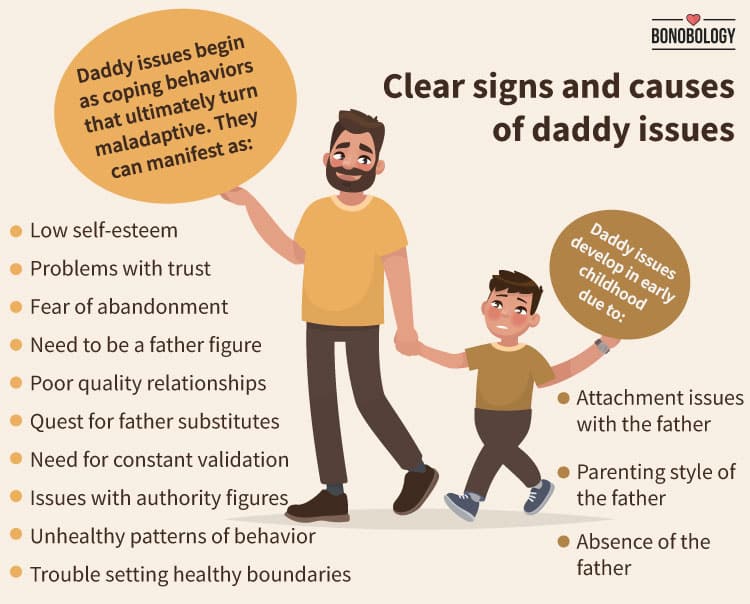Fathers wield troubling power, whether they like it or not, writes Katherine Angel in her book Daddy Issues: Love and Hate in the Time of Patriarchy. Science seems to agree. There is growing evidence — like this study and this one — to suggest that our early relationship with our father sets the template for:
- how we see ourselves,
- connect with the world,
- treat the people in our lives, and
- expect them to treat us.
What happens when this relationship goes awry or is non-existent? We may spiral into patterns of poor behavior and relationship decisions that are dubbed daddy issues in common speak. And they are far more complex than the hypersexualized archetypes that pop culture paints.
To get a better understanding of what are daddy issues, delve deeper into daddy issues meaning, how they manifest, and how to cope with them, we spoke to psychiatrist Dr. Dhruv Thakkar (MBBS, DPM) who specializes in mental health counseling, cognitive behavioral therapy, and relaxation therapy.
Daddy Issues Meaning
Table of Contents
So, what are daddy issues? “These are a range of unhealthy or maladaptive behaviors that can arise due to problematic parenting or parenting mistakes on the part of one’s father, or even his absence, and develop as coping behaviors in childhood,” says Dr. Thakkar. Such behaviors usually manifest as:
- Difficulties with trust
- Fear of abandonment
- Over-attachment to outcomes
- Need for approval
- Struggles with self-esteem or self-worth
- Quest for father substitutes
- Risky sexual behaviors, and more
“If these behaviors stick, they shape into what are called daddy issues,” Dr. Thakkar adds. According to him, though widely used, ‘daddy issues’ is not a clinical term. So where did it originate from? For that, we will need to delve into daddy issues psychology.
Related Reading: 15 Signs You Had Toxic Parents And You Never Knew It
Daddy issues psychology
Trauma comes back as a reaction, not a memory, writes Dr. Bessel van der Kolk in The Body Keeps the Score: Brain, Mind, and Body in the Healing of Trauma. People who have complicated or poor relationships with their fathers tend to form strong and unconscious images, associations, or feelings when it comes to their dads.
These unconscious impulses affect how they relate to their father, father figures, or authority figures in general. They also tend to get projected onto their romantic partners:
- A positive impulse could manifest as respect or adulation
- A negative impulse could present as trust issues, anxiety, or fear
These unconscious impulses make up the father complex. The idea of the father complex comes from Sigmund Freud and is linked to his well-known theory of the Oedipus complex. And it is this idea that has gained currency as ‘daddy issues’ in popular culture.
Daddy Issues Causes
So what lies at the root of daddy issues? According to Dr. Thakkar, there are primarily three factors that can cause people to develop a father complex or daddy issues. These are:
1. Parenting style of the father
“At a young age, I was [expected] to obey my father’s whims and defiance was met with swift yelling and physical punishment,” Quora user Rosemary Taylor recalls. Eventually, she started to fear angering others, which left her vulnerable to dominating partners and apprehensive about starting serious relationships.
People with unresolved issues with their fathers tend to develop behaviors that do not serve them well, especially in adult love relationships. Dr. Thakkar says these behaviors depend on whether their fathers were:
- Physically present but drew constant comparisons
- Loving but controlling
- Inconsistent in their presence or behaviors
- Emotionally unavailable or withdrawn
- Abusive
- Or, dysfunctional
“Often, women with emotionally unavailable fathers go on relationship sprees or pick unhealthy partners. Men and women with abusive fathers or dysfunctional fathers tend to rebel, or become highly submissive, or even, repeat abusive patterns or dysfunctional relationship cycles,” he explains.
2. Attachment issues with the father
How secure people are in adult relationships depends a lot on the way they felt around their parents growing up, particularly, how connected they felt to them. According to attachment theory, children with poor relationships with their primary caregivers develop insecure attachment styles. For instance, a broken relationship with one’s father can lead one to form:
- Fearful avoidant attachment style and have trouble trusting romantic partners or end up being emotionally distant from them
- Dismissive avoidant attachment style and reject or avoid intimacy
- Anxious/preoccupied attachment style and become insecure, obsessive, or cling to relationships
3. Absence of the father
If their father was physically absent, men and women may grow up fearing abandonment or fixate on a strong father figure — some men may even try to be one. Dr. Thakkar says, “Or, they may model their mother who did everything on her own and have trouble asking for help or delegating work.”
Though both men and women can develop daddy issues, over the years, the term has become overwhelmingly, and often disparagingly, associated with women. What’s more, society seems to have overlooked the place of daddies in daddy issues altogether, according to Angel. To do that is to mistake the symptoms for malaise. So, what are the symptoms of daddy issues? Let’s take a closer look.
Related Reading: 10 Subtle Abandonment Issues In Relationships And 5 Tips To Cope With Them
9 Clear Signs You Have Daddy Issues
“When it comes to daddy issues, it is important to understand that not everyone who grows up without a father, has a complicated relationship with their father, or carries attachment wounds from childhood ends up with such issues,” explains Dr. Thakkar.
So how to know if you have daddy issues? He offers a rule of thumb: “We all have issues. If the majority of your distress or the majority of your emotional baggage is coming out of patterns that originated from unresolved issues with your father, only then does it point to a father complex or daddy issues.”
Here are some clear signs of daddy issues in a woman and a man:

1. You seek father substitutes or try to be a father figure
According to Dr. Thakkar, when women grow up without their father, form an unhealthy bond with their dad, or have an emotionally unavailable father, they tend to seek father-type replacements:
- Someone seemingly strong, mature, and confident who can fulfill their subconscious desire to be acknowledged or protected
- Someone who can provide them the love or reassurance they missed growing up
“That’s why it is very common for women with daddy issues to date older men,” he says. That being said, not every younger woman who falls for an older man has daddy issues. Meanwhile, researchers have found that men who grow up without fathers tend to search for father substitutes in adulthood. Sometimes, unresolved issues with their fathers can lead men to try and be father figures themselves.
Dr. Thakkar recalls one client, Amit (name changed), who took on the role of a father figure for everyone in his life. “By doing so, he was trying to be the person he never had. So, whenever anyone rejected his — often unsolicited — help, he felt extremely distressed. He eventually learned healthier ways to still be a giving person without short-circuiting his boundaries or those of others around him. That saved him from a lot of emotional burnout.”
2. You form poor-quality relationships
Research has shown that our choice of intimate partners largely depends on our equation with the opposite-sex parent. Often, if a woman’s bond with her father is messy or non-existent, she may pick partners who repeat the same cycle of poor treatment or neglect that she experienced with her father.
In fact, difficulty forming healthy romantic relationships is one of the commonest signs of daddy issues in a woman. Men with daddy issues tend to get into poor relationship cycles, too.
“When Amit came for counseling, he was dating a girl who had grown up without her father. Through their relationship, they were both trying to fill the emotional void left by their father. Though it may provide momentary solace, such temporary replacement does not resolve the actual trauma. Since they were both coming from a place of lack, their issues remained constantly on the surface and their bond turned sour,” says Dr. Thakkar.
He says their connection improved only after they became emotionally independent and their relationship stopped revolving around one person being the provider and the other being the child figure or seeker.
3. You indulge in unhealthy patterns of behavior
Growing up with a father who does not meet your need for love or reassurance can be damaging to your mental health in more ways than one. It can even lead to self-sabotaging behaviors or poor behavior choices — one of the clearest daddy issues signs.
In one study, researchers found that:
- Having a disengaged father or experiencing poor-quality fathering can increase women’s chances of engaging in unrestricted or risky sexual behaviors
- Just remembering painful or disappointing experiences with their father can lead women to perceive greater sexual interest in men and indulge in unhealthy sexual behaviors
Dr. Thakkar recalls one client, Mitra (name changed), who grew up with a physically violent father. This led her to actively seek out pain as a coping mechanism. “Whenever she was emotionally disturbed or couldn’t deal with something, she would ask her boyfriend to hit her. Realizing how she was expecting unhealthy things from others and finding alternate coping strategies was what eventually helped her,” he adds.
Related Reading: 11 Examples Of Self-Sabotaging Behaviors That Ruin Relationships
4. You need constant validation if you have daddy issues
We all have an innate yearning for validation. For someone to tell us we’re doing a good job. Or, that our feelings make sense or are reasonable. Growing up, we often turn to our parents for this approval or assurance. So, what happens when this validation is lacking or comes with strings attached?
“When you always have to dance to be loved, who you are is constantly onstage. You’re only as good as your last A, your last sale, your last hit. And when your loved ones’ view of you can change in an instant, it cuts to the core of your being… ultimately, this way of life focuses on what others think, feel, say, and do,” say Tim Clinton and Gary Sibcy.
Dr. Thakkar explains, “Men and women with daddy issues tend to base their self-worth on what others think. So, they tend to people please and seek constant validation in relationships. They may even get overly attached to outcomes – such as marks or academic performance – since they feel they need to ‘earn’ their parent’s love.”
5. You have low self-esteem
“If your parents’ faces never lit up when they looked at you, it’s hard to know what it feels like to be loved and cherished…If you grew up unwanted and ignored, it is a major challenge to develop a visceral sense of agency and self-worth,” says psychiatrist and trauma research author Dr. Bessel van der Kolk.
“It is common for people with daddy issues to feel unloved or struggle with feelings of inadequacy or low self-esteem, especially if they grew up around a controlling father,” says Dr. Thakkar. Their insecure attachment styles lead them to over-analyze, over-apologize, and be over-critical of themselves — habits that further undermine their mental health.
How does this play out in their intimate relationships? They become needy, possessive, jealous, or anxious. They can even become codependent, take everything too personally, or fear confrontation. Sound familiar? Then it points to signs you have daddy issues.

6. You have trouble setting healthy boundaries
How to know if you have daddy issues? Take a good look at your boundaries — the limits you set when it comes to your time, emotions, or personal space, your personal rulebook for what’s okay for you and what’s not. Now try and answer these questions:
- How do you react when someone breaches these boundaries?
- How comfortable are you asserting them?
- What happens in situations where you would rather say no? Do you end up saying yes out of guilt or a fear of disappointing others?
“People with daddy issues struggle to set healthy boundaries in romantic relationships. This is especially true for those whose fathers were aggressive, abusive, or emotionally checked out,” says Dr. Thakkar. What’s the outcome? They find it hard to state their wants and needs in intimate relationships, which further erodes their self-esteem and mental health.
Related Reading: 19 Examples Of Healthy Boundaries In Relationships
7. You fear abandonment
Does the thought of your partner rejecting you flood you with anxiety? Are you constantly on tenterhooks because you’re afraid they will leave you? Are you holding tight to a dysfunctional marriage or an abusive partner because the thought of being alone is far scarier?
Insecure attachment styles or attachment issues with our father can lead us to believe that nothing is permanent and that good things don’t last. Here’s what happens next:
- We develop abandonment issues in adult relationships
- Or, we form fearful avoidant attachment styles that lead us to keep one foot out the door in intimate relationships because we can’t cope with heartbreak
Quora user Jessica Fletcher says her father issues led her to feel unworthy of love and push boundaries with her romantic partner “to see if he would abandon me too”. Ultimately, such maladaptive coping behaviors result in the very thing we dread: being alone or abandoned. They are also symptoms of daddy issues.
8. You have problems with authority figures
According to Dr. Thakkar, the way people interact with authority figures, say their teachers or supervisors at work, can be a clear marker of daddy issues. Often people who grew up around aggressive, overcontrolling, or abusive fathers:
- Get intimidated by anyone in authority to the point they freeze with anxiety
- Bend over backward to please them, or avoid authority figures altogether
- Or, rebel and become combative against any semblance of authority
These reactions usually arise from their associating authority figures with their fathers and automatically expecting certain behaviors from them, he explains.

9. You have major trust issues
“Whenever someone comes to me and says they don’t trust men in general or find it difficult to trust their partner, I first look at their history with their father. More often than not, men and women with daddy issues have a high trust deficit in their adult relationships,” says Dr. Thakkar.
This usually develops as a defense mechanism because they did not have a secure base or grew up thinking they couldn’t rely on their father. And what does that lead to? They constantly fear that their partner would turn on them or deceive them. So, they have difficulty opening up to their partner or being their authentic selves in a relationship. Eventually, keeping their guard up all the time leaves them exhausted and overwhelmed. It also takes a toll on their mental health.
Related Reading: 11 Things That Happen In Relationships Without Trust
5 Ways To Cope With Daddy Issues And Have Healthy Relationships
Any kind of childhood trauma can keep us stuck in survival mode — a near-constant state of fight-or-flight or permanent alert that keeps our body and mind trapped in the past. This prevents us from healing. It keeps us from planning a future and living our best life. It is also what leaves us struggling to trust or put down roots and thrive. Survival mode may work as a way to cope, but it is hardly meant to be a way of life. So, what are some ways to resolve daddy issues and forge healthy relationships? Dr. Thakkar shares some tips:
1. Practice self-awareness
Often, people with daddy issues don’t make the connection between the behavior or problems they are facing and their bond with their father. So, the first step is recognizing how your equation with your father is affecting you. To do this, you will need to start practicing self-awareness.
“Make a habit of observing your reactions in your routine life. Take a journal and jot down your everyday behaviors, thoughts, and actions. Also, watch how you interact with others around you,” advises Dr. Thakkar.
Next, try and pinpoint the triggers for your behaviors and emotional patterns. You may need to take the help of a mental health professional to do this. “If your behaviors or relationship problems stem from daddy issues, there will be a direct link to problematic parenting,” he explains. Remember, self-awareness is not self-judgment. It is also a process and almost always presents a choice: to continue old patterns or build healthier ones.
2. Get professional help
“Often, by the time children grow up and become aware of their daddy issues, they are so deeply entrenched or have gotten so complex that they are in no position to deal with them on their own,” says Dr. Thakkar. That’s why seeking therapy or reaching out to a mental health professional could help.
Remember the words of the late television host Fred Rogers: “Anything that’s human is mentionable, and anything that is mentionable can be more manageable. When we can talk about our feelings, they become less overwhelming, less upsetting, and less scary.”
If you’re looking for help, counselors on Bonobology’s panel are just a click away.
3. Build self-acceptance
If you experienced trauma at an early age or developed insecure attachment styles, chances are you did not develop a strong or positive sense of self. “In order to heal, you will need to accept yourself completely, and that means no judgments, no beating yourself up about the past, and instead, learning to be comfortable in your skin,” says Dr. Thakkar.
That also means not numbing, minimizing, or ignoring your gut feelings, but tuning hard into them, even if it is uncomfortable or scary. It is learning not to blame yourself for what your father did or didn’t do. And it means taking your attention away from people’s opinions or approval and putting the focus firmly back on you and figuring out what you really want in a situation or relationship. This will also help you set better boundaries to form healthier relationships.
Related Reading: How To Love Yourself – 21 Self Love Tips
4. Think about alternative coping behaviors
If you carry the bricks from your past relationships, you will end up building the same house. Healing starts with breaking unhealthy patterns or behaviors that hold us back and paving new pathways of thinking and coping, one fresh brick at a time. “Once you know which coping behaviors don’t serve you, think about how you can replace them. Make a list of alternatives,” says Dr. Thakkar. Don’t be afraid to reach out for help.
5. Learn to manage your expectations
When we constantly bend our reality to someone else’s script or expected version of us, it twists our perceptions and expectations. Ultimately, this becomes a trap that holds us hostage to poor patterns or behaviors. To cope with daddy issues, you will need to take a closer look at your expectations, find ways to manage them or reset them, and keep them real.
Key Pointers
- Daddy issues arise as coping behaviors in childhood
- They develop in response to a poor relationship with or the absence of one’s father
- They manifest as a search for father substitutes, lack of trust, and difficulty in forming healthy relationships
- They erode our self-esteem, prevent us from setting healthy boundaries, and do not serve us well
- Coping with them requires a major shift in the way we see ourselves and the way we respond to others
As with most things in life, when it comes to daddy issues, there is always a chance to course-correct. Don’t let a negative relationship with your father define who you are. Lean into your own self and set your own path, even if it is one shaky step at a time.
FAQs
It means that she has developed a range of maladaptive behaviors due to parenting mistakes, emotional unavailability, inconsistency, or absence of her father. They manifest as issues with trust, a constant need for validation, a lack of self-esteem, or fear of abandonment. They also keep her from forming healthy relationships as an adult.
Resolving daddy issues is a process and it takes time and effort. It can involve practicing self-awareness and self-acceptance, or setting healthy boundaries and resetting your expectations. It may even require you to seek professional help.
Talking To Your Partner About Your Dysfunctional Family – The Right Way, And Should You?
Your contribution does not constitute a charitable donation. It will allow Bonobology to continue bringing you new and up-to-date information in our pursuit of helping anyone in the world to learn how to do anything.



Featured
5 Harsh But True Signs He’ll Never Marry You
21 Signs That You Are Alone In A Relationship
11 Situationship Red Flags You Should Know About
Why Do I Get Attached So Easily? 9 Possible Reasons and Ways to Stop
How To Respond To DARVO: Expert Lists 7 Strategies
What Is Fexting, And Why Is It Bad For Your Relationship?
Are Narcissists Capable Of Love?
11 Prominent Male Narcissist Traits to Watch For
Why Does My Girlfriend Hit Me? Expert Shares 11 Possible Reasons And Ways To Cope
How Does A Narcissist React When They Can’t Control You?
“My Anxiety Is Ruining My Relationship”: 6 Ways It Does And 5 Ways To Manage It
13 Distinctive Traits Of Female Narcissists Revealed
Recognizing The 13 Red Flags Of A Controlling Relationship
What Are The Examples Of Narcissistic Behavior In A Relationship?
11 Signs He Is Forcing Himself To Love You
21 Signs The Relationship Is Over For Him and How To Deal With It
21 Stages Of A Narcissistic Relationship With An Empath
Understanding Hysterical Bonding: What It Is And Why It Happens
19 Glaring Social Media Red Flags In Relationships You Should Never Ignore
Lying By Omission And Its Consequences On Relationships